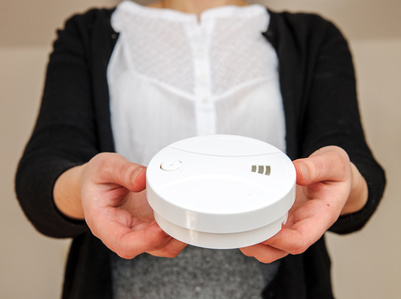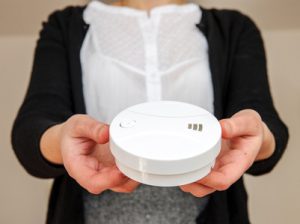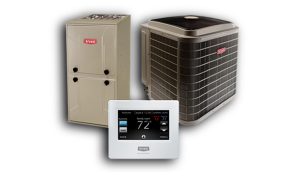Safety Tips
- Have your home heating systems (including chimneys and vents) inspected and serviced annually by a trained service technician.
- Never use portable generators inside homes or garages, even if doors and windows are open. Use generators outside only, far away from the home.
- Never bring a charcoal grill into the house for heating or cooking. Do not barbeque in the garage.
- Never use a gas range or oven for heating.
- Open the fireplace damper before lighting a fire and keep it open until the ashes are cool. An open damper may help prevent build-up of poisonous gases inside the home.
- Install battery-operated CO alarms or CO alarms with battery backup in your home outside separate sleeping areas.
- Know the symptoms of carbon monoxide poisoning: headache, dizziness, weakness, nausea, vomiting, sleepiness, and confusion. If you suspect CO poisoning, get outside to fresh air immediately, and then call 911.
Know the Symptoms of CO Poisoning
Because CO is odorless, colorless, and otherwise undetectable to the human senses, people may not know that they are being exposed. The initial symptoms of low to moderate CO poisoning are similar to the flu (but without the fever). They include:
- Headache
- Fatigue
- Shortness of breath
- Nausea
- Dizziness
High level CO poisoning results in progressively more severe symptoms, including:
- Mental confusion
- Vomiting
- Loss of muscular coordination
- Loss of consciousness
- Ultimately death
Symptom severity is related to both the CO level and the duration of exposure. For slowly developing residential CO problems, occupants and/or physicians can mistake mild to moderate CO poisoning symptoms for the flu, which sometimes results in tragic deaths. For rapidly developing, high level CO exposures (e.g., associated with use of generators in residential spaces), victims can rapidly become mentally confused, and can lose muscle control without having first experienced milder symptoms; they will likely die if not rescued.
What CO level is dangerous to my health?
The health effects of CO depend on the CO concentration and length of exposure, as well as each individual’s health condition. CO concentration is measured in parts per million (ppm). Most people will not experience any symptoms from prolonged exposure to CO levels of approximately 1 to 70 ppm but some heart patients might experience an increase in chest pain. As CO levels increase and remain above 70 ppm, symptoms become more noticeable and can include headache, fatigue and nausea. At sustained CO concentrations above 150 to 200 ppm, disorientation, unconsciousness, and death are possible.
What should I do if I am experiencing symptoms of CO poisoning and do not have a CO alarm, or my CO alarm is not going off?
If you think you are experiencing any of the symptoms of CO poisoning, get outside to fresh air immediately. Leave the home and call your fire department to report your symptoms from a neighbor’s home. You could lose consciousness and die if you stay in the home. It is also important to contact a doctor immediately for a proper diagnosis. Tell your doctor that you suspect CO poisoning is causing your problems. Prompt medical attention is important if you are experiencing any symptoms of CO poisoning. If the doctor confirms CO poisoning, make sure a qualified service person checks the appliances for proper operation before reusing them.
Are CO alarms reliable?
CO alarms always have been and still are designed to alarm before potentially life-threatening levels of CO are reached. The safety standards for CO alarms have been continually improved and currently marketed CO alarms are not as susceptible to nuisance alarms as earlier models.
How should a consumer test a CO alarm to make sure it is working?
Consumers should follow the manufacturer’s instructions. Using a test button tests whether the circuitry is operating correctly, not the accuracy of the sensor. Alarms have a recommended replacement age, which can be obtained from the product literature or from the manufacturer.
How should I install a CO Alarm?
CO alarms should be installed according to the manufacturer’s instructions. CPSC recommends that one CO alarm be installed in the hallway outside the bedrooms in each separate sleeping area of the home. CO alarms may be installed into a plug-in receptacle or high on the wall. Hard wired or plug-in CO alarms should have battery backup. Avoid locations that are near heating vents or that can be covered by furniture or draperies. CPSC does not recommend installing CO alarms in kitchens or above fuel-burning appliances.
What should you do when the CO alarm sounds?
Never ignore an alarming CO alarm! It is warning you of a potentially deadly hazard.
If the alarm signal sounds do not try to find the source of the CO:
- Immediately move outside to fresh air.
- Call your emergency services, fire department, or 911.
- After calling 911, do a head count to check that all persons are accounted for. DO NOT reenter the premises until the emergency services responders have given you permission. You could lose consciousness and die if you go in the home.
- If the source of the CO is determined to be a malfunctioning appliance, DO NOT operate that appliance until it has been properly serviced by trained personnel.
If authorities allow you to return to your home, and your alarm reactivates within a 24 hour period, repeat steps 1, 2 and 3 and call a qualified appliance technician to investigate for sources of CO from all fuel burning equipment and appliances, and inspect for proper operation of this equipment. If problems are identified during this inspection, have the equipment serviced immediately. Note any combustion equipment not inspected by the technician and consult the manufacturers’ instructions, or contact the manufacturers directly, for more information about CO safety and this equipment. Make sure that motor vehicles are not, and have not been, operating in an attached garage or adjacent to the residence.
Do some cities require that CO alarms be installed?
Many states and local jurisdictions now require CO alarms be installed in residences. Check with your local building code official to find out about the requirements in your location.




